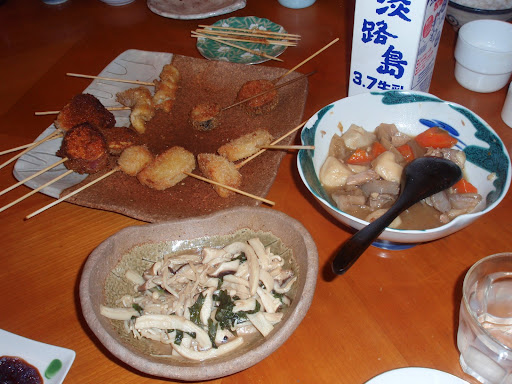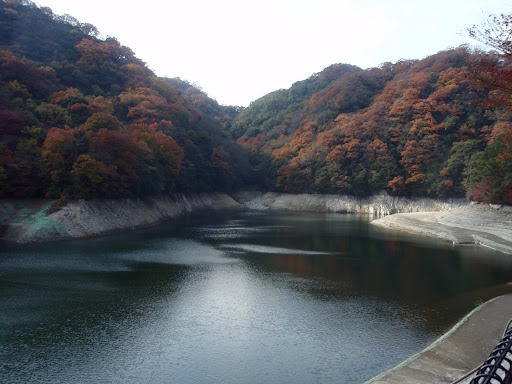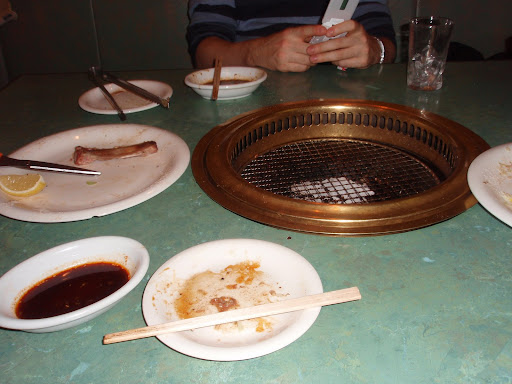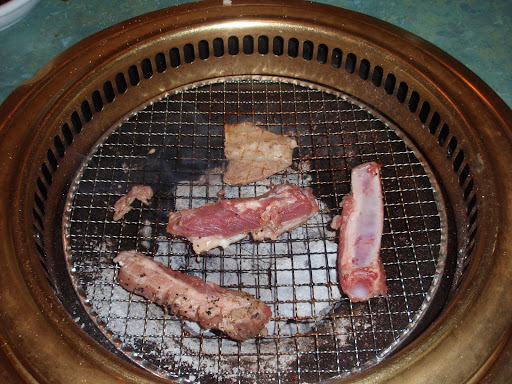Original Posting Date: Wednesday December 12th 2007
No, this week there isn't something new (or interesting) to report. I just signed up for the University-organised skiing-trip to Nagano in January. There are real mountains and anyone who can still remember, the 1998 Olympic Winter Games were held in Nagano, including Hermann Maier's "flight impromptu".
The whole thing is a little bit expensive in fact, but thanks to my stipend/grant from the state of Japan not too big of a problem (what do you mean, that's not what it's intended for? Then what else, if not for experiencing Japan).
The other day I became aware (actually through a German, who can't speak Japanese), what a weird impression it must make when I talk to the Chinese from my Business Administration classes.
How does an Austrian communicate with a female Chinese? Not in German, Chineses or English but in Japanese. It seems to really leave (according to my colleague) a peculiar impression on a Westerner, even if I can't (anymore) quite understand why.
Speaking of which: The majority of the Chinese (and some Koreans), of whom I met at the University up to now, regardless if during the summer or since september, can often speak Japanisch far better than English. This is insofar interesting, as that larger parts of the Chinese population still hate or despise Japan because of its actions during World War II (because Japan has some difficulties coming to terms with it, respectively). A fact, which is sometimes boosted by the propaganda of the communist government (Mental note: An outside common opponent covers internal problems). Despite that it's not a taboo at chinese schools or Universities to learn Japanese or complete a foreign semester (or years) in Japan, whereupon of course more emphasis is put on Japanese instead of English (also they might be more similar in terms of culture, the Chinese don't have as big problems with the accursed kanji respectively).
Interesting (and funny) facts/opinions about Japan:
Bureaucracy in Japan.
Since Japan puts a very large emphasis on accurateness, details and the so-called"inside-the-box" thinking, the bureaucracy and the officialdom is structured accordingly. Interestingly or maybe rather frighteningly it is very similar to the austrian, so that the learned Austrian has far fewer problems or fits of rage than his complements from other non-asian countries (although, to do it justice, it has to be mentioned at this point that our officialdom and bureaucracy has improved very much in recent years).
However, the resemblances are uncanny, concerning the bureaucratic fondness for details, the pushing forth-and-back of documents between sections and the adherence to hierarchy. Though here, like in Austria, you can often by a little cajoling, a little whining and the if any pleading ("look, I kno' that normal 'this not possible, but I need 't urgently ..." et cetera) make seemingly impossible things, possible, strongly abbreviate the process respectively. This manner is unfamiliar to a German colleague, and led to a outburst of rage. We both received a little weird mail, in which we were denied a definite thing at University (no details here), which would have caused both of us problems. As Austrian my way of thinking was: First call the office and ask what that's all about, talk to 'em and look if we can't wangle something". No sooner said than done and after 15 minutes of talk, pleading, explanations and a few calls on the part of the secretary, the problem was solved and I went home relieved. The German on the other hand called the central office and awfully complained (even very loudly), "what's the meaning of this" and "How could that be". Later he explained to me, that in the part of Germany where he is from, it is common that such letters are final, that you can't do a thing by discussing and the best way is to complain at the main office at once. These are arguable the differences between the german and the austrian bureaucracy, whereas the user of the latter, because of the similarities, has it easier in Japan (which shouldn't mean, that sometimes it isn't, like at home, just exasperating).
Still, there is one striking difference: The absence of the grouchy civil servant. For, whatever concern one has, whatever office is in the mix, or with whom you speak, the civil servant vis-à-vis, adherend to the picture of a Japanese, is always polite and friendly and always tries to help, or tries to give this impression as not to damage the public image of the civil servants (the famous, already several times mentioned , "Not-losing-the-face" game).
In short: There are no grouchy persons.
Even if it must often be very hard to show good behaviour, especially when you have to service a bawdy Gaijin (foreigner).
Thursday 26 August 2010
Thursday 19 August 2010
My Weekend (Scrubs-reference)
Original Posting Date: Wednesday December 5th 2007
This time too a relative short entry, for there didn't happen much new.
Friday:
A group of people was in the evening at Osaka to celebrate the birthday of the female Swede from our student's home. We stayed the whole night at a club, where a couple arguably exaggerated celebrating (expecially the male Swede and our in-house Bulgarian).
However, the most eye-catchers were the girls. I have never seen so many girls, who looked the like, excuse the expression, "cheap whores", but seriously, those you see at home mostly on the edge of the footpath (sidewalk), personelly can't stand something like that at all.
Should anyone still believe that all japanese girls are dressed reserved and "chaste", he should visit such a club because those are only there for picking up guys. One of the lads who were with us left the club with "one of those". Concerning myself I tried to rather stay away. And before anyone now comes up with "Are you nuts? Letting go of a sure thing?" or something similar, I just say: If someone likes things like this, please, be my guest, but please don't come running crying, when you caught anything, and if it only be a swinging blow of one of 'em 2 metre blacks (there were several at the club) who has he sights on the same one.
Didi must be sooo proud

Saturday:
A ususal day filled woth learning and spiced up by preparing a group presentation for Tuesday, which, by the way, went well. Even though one of my japanese partners can speak very little English and I had therefore present his part too.
Afterwards I was once again invited at my hostfamily's from the summer to dinner, which was (as always) excellent. After that I showed them a few pictures from Neusiedl, the concert band and the Uhudler-cellar-district festival (ad Bernie: You were captured really well, but they were most amused about Dominik's "sleeping at the table).

And because there already were many requests: Here's "my" family

Sunday:
Here I was once again hiking with David from Ireland, in the ridge of the Kobe-region, this time to Peak Maya. We were a little bit disappointed however when we got up pretty fast, which then again isn't astonishing considering the ca. 701 meters, whereupon the view over the region was again amazing. On the descend we left the hiking track and waded trough the woods and a dried up river bed. This was fun, exhausting, for David also a little dangerous, since he isn't really used to mountains and rocks and it was a compensation for the boring ascend. All in all we were en route for only 7 hours this time (net hiking time: 6).

To round off the weekend in the weekend I went to eat Yakiniku (literal: roasted/grilled meat) with the Briton Simon too. For this you get the food (80% meat therefor) served raw and flavoured, which then you grill by yourself via an in the table board embedded grill. Exceedingly tasty and not even that expensive in the right restaurants.


Interesting (and funny) facts/opinions about Japan:
Known very much, and appreciated especially by foreigners, are so called Hyaku-en (100 yen) shops in Japan. For, as the name suggests, the price of most wares is only at 100 yen (ca. 64 cent). More expensive products are tagged specially. The main part of the product line-up is composed by daily housewares and commodities, whereas the quality, opposed to the suggestion by the low price quite satisfying is. Since those objects are ideal, if you are only staying a couple of months or a year in Japan, I said especially with foreigners, who don't need top-quality, durable for many years. However, many Japanese too puchasee stuff there themselves, and as such not only those who are on a budget on necessity, because it is nothing laughable socially in shopping at a Hyaku-en shop. Not like it was at home in earlier times, when people, who to Hofer for shopping were smiled upon. The again, Hofer too has advanced itself concerning the quality of its products. Larger shops house also foods and middle-sized equipment with their assortment, thus my tip: Should one stay in Japan for only a short time and despite that have a need for housewares, those shops offer nearly always the best price-performance ratio.
This time too a relative short entry, for there didn't happen much new.
Friday:
A group of people was in the evening at Osaka to celebrate the birthday of the female Swede from our student's home. We stayed the whole night at a club, where a couple arguably exaggerated celebrating (expecially the male Swede and our in-house Bulgarian).
However, the most eye-catchers were the girls. I have never seen so many girls, who looked the like, excuse the expression, "cheap whores", but seriously, those you see at home mostly on the edge of the footpath (sidewalk), personelly can't stand something like that at all.
Should anyone still believe that all japanese girls are dressed reserved and "chaste", he should visit such a club because those are only there for picking up guys. One of the lads who were with us left the club with "one of those". Concerning myself I tried to rather stay away. And before anyone now comes up with "Are you nuts? Letting go of a sure thing?" or something similar, I just say: If someone likes things like this, please, be my guest, but please don't come running crying, when you caught anything, and if it only be a swinging blow of one of 'em 2 metre blacks (there were several at the club) who has he sights on the same one.
Didi must be sooo proud
Saturday:
A ususal day filled woth learning and spiced up by preparing a group presentation for Tuesday, which, by the way, went well. Even though one of my japanese partners can speak very little English and I had therefore present his part too.
Afterwards I was once again invited at my hostfamily's from the summer to dinner, which was (as always) excellent. After that I showed them a few pictures from Neusiedl, the concert band and the Uhudler-cellar-district festival (ad Bernie: You were captured really well, but they were most amused about Dominik's "sleeping at the table).
And because there already were many requests: Here's "my" family
Sunday:
Here I was once again hiking with David from Ireland, in the ridge of the Kobe-region, this time to Peak Maya. We were a little bit disappointed however when we got up pretty fast, which then again isn't astonishing considering the ca. 701 meters, whereupon the view over the region was again amazing. On the descend we left the hiking track and waded trough the woods and a dried up river bed. This was fun, exhausting, for David also a little dangerous, since he isn't really used to mountains and rocks and it was a compensation for the boring ascend. All in all we were en route for only 7 hours this time (net hiking time: 6).
To round off the weekend in the weekend I went to eat Yakiniku (literal: roasted/grilled meat) with the Briton Simon too. For this you get the food (80% meat therefor) served raw and flavoured, which then you grill by yourself via an in the table board embedded grill. Exceedingly tasty and not even that expensive in the right restaurants.
Interesting (and funny) facts/opinions about Japan:
Known very much, and appreciated especially by foreigners, are so called Hyaku-en (100 yen) shops in Japan. For, as the name suggests, the price of most wares is only at 100 yen (ca. 64 cent). More expensive products are tagged specially. The main part of the product line-up is composed by daily housewares and commodities, whereas the quality, opposed to the suggestion by the low price quite satisfying is. Since those objects are ideal, if you are only staying a couple of months or a year in Japan, I said especially with foreigners, who don't need top-quality, durable for many years. However, many Japanese too puchasee stuff there themselves, and as such not only those who are on a budget on necessity, because it is nothing laughable socially in shopping at a Hyaku-en shop. Not like it was at home in earlier times, when people, who to Hofer for shopping were smiled upon. The again, Hofer too has advanced itself concerning the quality of its products. Larger shops house also foods and middle-sized equipment with their assortment, thus my tip: Should one stay in Japan for only a short time and despite that have a need for housewares, those shops offer nearly always the best price-performance ratio.
Subscribe to:
Posts (Atom)